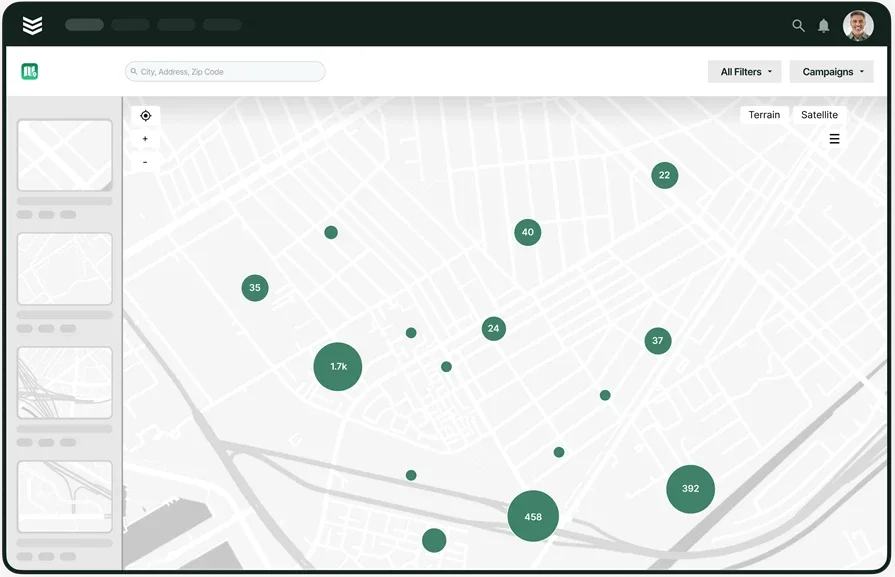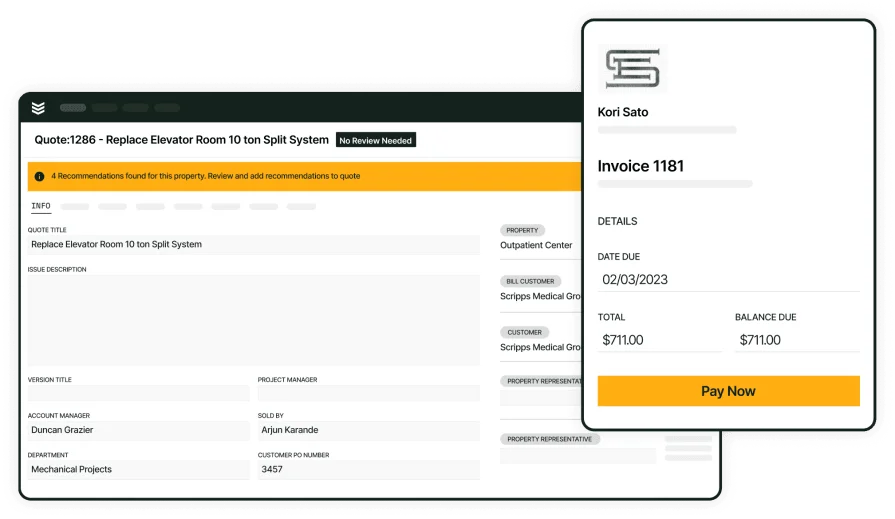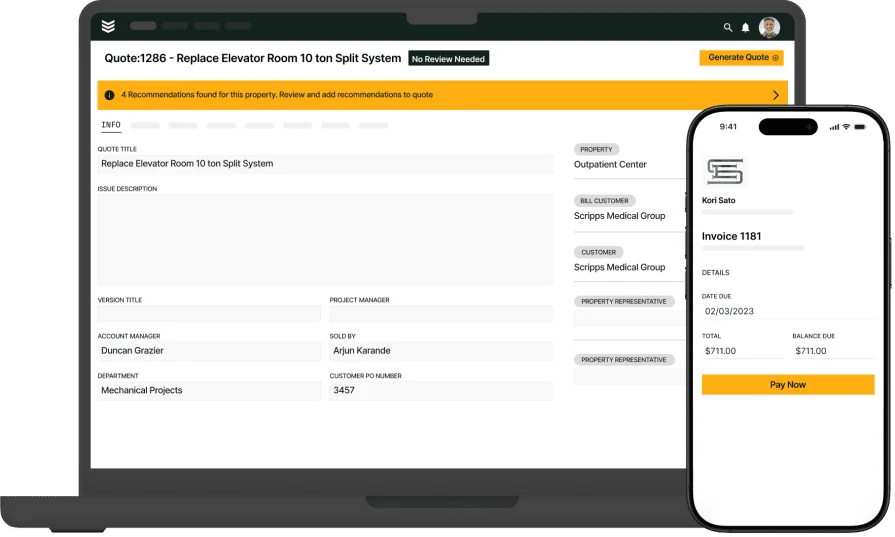Getting contractor bids out the door fast makes all the difference—especially when you're competing for tight deadlines and high-value jobs. If your crew is quoting HVAC installs one day and juggling change orders the next, you need a contractor bid app that moves at your pace. Manual spreadsheets and back-and-forth emails only slow things down. You need tools that keep you bidding clean, winning faster, and backing every quote with real numbers.
This guide breaks down the top tools built for contractors working in the field—not at a desk. Whether you're using a contractor leads app to keep the pipeline full, or relying on a contractor proposal app to secure approvals on-site, each app listed here helps you handle bids without missing a beat. And if your workflow ties into scheduling, job tracking, or service calls, the right contractor bidding app should plug right into your field service management system—so every estimate leads to booked work.
Here’s what we’ll cover:
- Choosing the best contractor bid app for your team
- 6 key features to look for in a contractor bidding app
- 5 types of contractor bidding apps
- 8 best contractor bid apps to choose from
- 7 benefits of using an app for contractor bids
- 4 important FAQs about contractor bidding apps–answered
No two crews quote jobs the same way. Some chase high-volume leads, others focus on large commercial builds. Whether you’re quoting from the field or back in the office, your app for contractor bids should match how your team works—fast, flexible, and built to win.
Choosing the best contractor bidding app for your team
Before diving into features and pricing, start with this: what does your crew actually need in the field? A contractor bid app should make quoting feel less like paperwork and more like a power tool—something that speeds up the job, not slows it down.
Your team’s in the middle of site visits, change orders, and last-minute calls. If your app can’t keep pace with that kind of chaos, it's just another task. The best apps support how your techs move, how your jobs run, and how fast your team turns quotes into scheduled work. Here’s what to focus on:
- How your team builds bids - Does the app support how your team actually creates bids—copying past jobs, using templates, or starting from zero? Can field techs adjust line items without calling the office?
- Does it let you quote mid-walkthrough and send before leaving the site?
- Who’s using it and why - Are your estimators office-based, or do your techs in the field need to build quotes too? Can you give different access levels depending on the role? Does it make things easier for the crew, or add more steps?
- What kind of work you quote - Are you handling quick service jobs, major installs, or a mix of both? Does the app break out costs for labor, materials, rentals, and subs in a way your clients can actually understand? Can you create reusable scopes for common job types?
- Where it gets used - Are crews quoting from job trailers, trucks, or back at the shop? Can the app run without a full signal and still sync when it comes back online? Does it work across laptops, tablets, and phones without bugs?
- Features - Can it pull in saved pricing, calculate margins, or flag missing scope items? Does it connect with your calendar, dispatch board, or accounting software? Can it send clean proposals through a contractor proposal app without needing a PDF workaround?
Once you know how your crew operates, you can zero in on the contractor bidding app that actually fits your day-to-day. Whether you’re chasing contractor leads or keeping a steady pipeline full, the right app for contractor bids helps you quote clean, move fast, and stay sharp from estimate to sign-off. Next up: let’s break down the features that matter when the job’s on the line and there’s no time for do-overs.
6 key features to look for in a contractor bid app
A contractor bid app should help you move faster, quote cleaner, and keep the crew focused on the work—not chasing paperwork. When your field techs are juggling jobs, approvals, and updates, every feature in your bidding tool should support how they operate out in the field.
1. Real-time scheduling and dispatching
Once a bid is accepted, it needs to hit the schedule without delay. The best contractor bidding apps sync directly with field service scheduling and dispatch software so you can move straight from approval to job assignment. Think about a service plumbing crew handling emergency leak repairs. They quote the fix on-site, send the proposal, and once approved, the app automatically schedules the crew for the follow-up. No back-and-forth, no lag—just booked and rolling.
2. Mobile tools for quoting in the field
Your team should never have to wait to get back to the office to send a bid. A strong contractor bidding app needs to include a technician mobile app that lets field techs create, adjust, and send proposals directly from the jobsite. For example, your HVAC tech is mid-inspection on a rooftop unit. They uncover additional work, update the quote right there on the mobile device, and get approval while still on the ladder. That means faster turnaround—and fewer delays in getting paid.
3. Lead tracking with CRM integration
Winning jobs starts with tracking every lead. A contractor leads app that integrates with a CRM tool helps your team follow up smarter and close bids before competitors even reply. Picture a field service contractor bidding on multiple retail buildouts. With every GC, contact, and follow-up tracked in one place, the office team knows exactly who to chase and when. No more leads slipping through the cracks.
4. Invoicing and payment tools built in
After a job wraps, you should be able to bill and collect without rebuilding the numbers. A connected contractor proposal app that supports field invoicing and payment processing keeps billing tight and payment quick. For example, a commercial refrigeration contractor finishes an install for a chain restaurant. With just a few taps, the app converts the approved proposal into an invoice and collects the deposit—all before the tech even loads up the truck.
5. Time tracking that supports job costing
The labor hours you quote should line up with the ones you bill. Bidding apps that include time tracking features give you real job data that makes your future quotes smarter. Say your electrical crew quoted 40 hours for a panel upgrade. As the job runs, techs log time directly into the app. After completion, you compare actual hours to estimated ones—then adjust your pricing template so the next bid hits even tighter.
6. Strong data for pipeline forecasting
When bids are flying out the door, it helps to know what’s pending, what’s approved, and what still needs a push. A smart pipeline tracking tool built into your contractor bid app gives you that real-time view of your upcoming workload. Imagine you’ve got ten open bids across HVAC service contracts. With pipeline visibility baked into your app for contractor bids, you can sort by value, stage, or close probability—and steer your crew toward the work that’s closest to landing.

Explore our CRM product
Keep client lists organized, track job progress, and keep projects rolling.
Other notable features for contractors to get in a bidding app
While the core tools drive how you win and deliver work, some features can still give your team a sharper edge—especially if you're growing fast or handling multiple jobs at once. These additions may not be essential for every contractor bidding app, but they make a difference when you’re dialing in your process and scaling your operation.
- Service agreement tracking - A contractor bid app that connects with service agreement management helps track recurring jobs, maintenance contracts, and client commitments—so you’re not scrambling when renewals come due.
- Reporting and insights - Tying your contractor bidding app to reporting tools helps you understand win rates, average job value, and quote accuracy. It turns raw numbers into useful decisions, whether you're quoting one job or juggling fifty.
- Fleet visibility - Apps that connect with fleet tracking software give you a live view of where your techs are—so when a proposal gets approved, you know who’s close and ready to move.
These tools won’t replace the need for a strong contractor proposal app or a clean app for contractor bids—but paired with the right setup, they tighten the entire process and keep your crew in sync from quote to close.
5 different types of contractor bidding apps
Every crew runs a little different. Some work off tight job turnarounds, others plan months ahead. That’s why not all contractor bidding apps hit the same. Some are light and fast, built for mobile quoting in the field. Others are heavy-duty, built to handle the whole job stack from bid to bill. What matters is picking the one that fits how your team actually works.
1. Office-installed bidding programs
These tools live on company desktops and are often packed with custom features. They work best for estimators who never leave the office and have time to tweak every detail. But if your crew is mobile and your jobs move fast, this setup locks your team into slow turnarounds and limited access.
2. Cloud-based bidding platforms
You access these through a browser, no installs needed. Everything syncs automatically, which helps your field and office stay on the same page. These platforms suit contractors working across multiple locations who need to keep quotes moving without chasing down the latest file version.
3. Apps made for mobile use
Built for phones and tablets, these apps are designed for techs who quote on the fly. They keep things simple, fast, and accessible even when cell service drops out. This works well for service contractors who need to send proposals straight from the site without logging extra hours after the job.
4. Full-service contractor systems
These do more than just help you bid. They handle dispatch, job tracking, payments, and client communication in one hub. If your crew is growing or juggling lots of moving parts, this type of contractor proposal app gives you control without extra tools scattered everywhere.
5. Trade-focused bidding apps
Some contractor bid apps are built around specific trades like mechanical, fire safety, or refrigeration. These often include labor pricing, preloaded assemblies, or takeoff templates built for that kind of work. If your jobs follow similar scopes, these can speed things up and keep your quotes consistent.
8 best contractor bid apps to choose from
If you're still quoting in spreadsheets or jumping between tools to send out a bid, there’s a better way. The best contractor bidding apps give your team what they need to send accurate quotes fast—without losing time on double entry or chasing paperwork. Whether you’re quoting HVAC replacements, plumbing rough-ins, or full buildouts, the tools below are built to handle the pressure. Here's a breakdown of eight options, and which type of contractor each one fits best.
1. Best for commercial contractors: BuildOps
Commercial contractors managing multiple teams, overlapping schedules, and high-value jobs need a platform that keeps pace. BuildOps delivers by connecting quoting with everything that happens next—dispatch, scheduling, labor, and billing. Estimators can create bids using saved templates, add service items on the fly, and lock in signed proposals right from the field. From the first walkthrough to project closeout, the entire workflow stays inside one system.
How pricing works: BuildOps offers custom pricing based on your business needs, project volume, and feature set. You'll connect with their team for a tailored demo and quote.
Features beyond bidding: Includes scheduling, dispatching, CRM, reporting, mobile field access, invoicing, time tracking, and more—all built for complex job coordination.
What sets it apart for commercial crews: The BuildOps contractor bid app gives your team control over high-pressure projects. You can go from estimate to scheduled job without switching tools or losing speed.

Explore our bidding app
See how we help field techs quote jobs and manage assignments from one place.
2. Best for residential subcontractors: GoCanvas Handyman Bid App
Image Source: GoCanvas
GoCanvas Handyman Bid App keeps things simple for small teams focused on residential work. It helps you generate quick quotes in the field using templates and checklists, with tools to email or print on-site. It’s a solid match for contractors doing small-scale service work like repairs, installs, and maintenance. It lacks project management, scheduling, or workforce coordination features for larger teams handling multiple jobs.
How pricing works: GoCanvas uses a tiered subscription model based on users and forms. Entry-level pricing is available for solo or small teams.
Features beyond bidding: Basic mobile forms, field data capture, photo attachments, and simple client signoff built into each quote.
What sets it apart for residential: Great for fast-turnaround work—especially if you’re running small crews without dedicated office support.
3. Best for general subcontractors: PlanHub
Image Source: PlanHub
PlanHub connects subcontractors with bidding opportunities from general contractors and developers. You can search for active projects, download specs, and send in your proposals through the platform. It’s built for keeping your pipeline full—especially if you’re hunting for new work consistently. It focuses on finding jobs, not managing your team or scheduling work—so you’ll still need other tools to handle job execution.
How pricing works: Offers a free version for browsing open bids; premium plans unlock project visibility by region, trade filters, and direct communication tools.
Features beyond bidding: Bid tracking dashboard, project alerts, document sharing, and subcontractor communications.
What sets it apart for general subs: It’s a business development tool as much as a contractor bidding app—perfect for teams looking to grow their footprint by bidding on fresh leads every week.
4. Best for small to mid-sized contractors: SmartBid
Image Source: SmartBid
SmartBid is designed for contractors that manage formal bid processes, especially when dealing with architects, engineers, and large-scale commercial clients. It offers detailed control over project documents, subcontractor communications, and quote tracking. If you regularly work in competitive bidding environments, this gives you the structure to stay organized. It’s not built for fast-paced field work—contractors handling daily service or emergency calls may find it too rigid.
How pricing works: Plans are customized depending on project size, feature needs, and the number of users. You'll need to request a quote for exact pricing.
Features beyond bidding: Subcontractor invitations, bid tabulation, secure document storage, and project-specific tracking.
What sets it apart for small to mid-sized firms: It brings transparency and control to preconstruction and formal RFPs, which is valuable when you’re bidding competitively and coordinating across multiple vendors.
5. Best for all-in-one estimating: STACK
Image Source: STACK
STACK is built for contractors who want to manage takeoffs and estimates inside one platform. With cloud-based plan markup tools and detailed measurement tracking, it’s geared toward trades that rely heavily on blueprints and detailed scope. Estimators can quickly mark up plans, assign quantities, and convert takeoffs into detailed bids without jumping into spreadsheets. It’s not a full field-service platform—contractors still need separate tools for dispatching, time tracking, or on-site quote adjustments.
How pricing works: Starts with a free version offering limited projects. Paid plans unlock full access to takeoff and estimating features, with options for additional users and integrations.
Features beyond bidding: Digital takeoff tools, material/labor database, team collaboration, and integration with project management platforms.
What sets it apart for takeoff-heavy work: It shines for teams who spend most of their time bidding from plan sets and need accuracy at scale.
6. Best for service-based contractors: ServiceTitan
Image Source: ServiceTitan
ServiceTitan helps service contractors build quotes, schedule jobs, and manage customer communications from one system. Its strength lies in pairing quoting with workflow tools—so from the time a job is sold, it's already lined up for scheduling and invoicing. Designed for high-volume service work, it helps field techs quote in real time with built-in pricing catalogs. It can be overbuilt for contractors focused on project work or low-volume, high-dollar installs.
How pricing works: Pricing is custom and based on business size, number of users, and feature set. Most contractors will need to request a demo to get a quote.
Features beyond bidding: CRM, job scheduling, invoicing, payments, membership management, and technician tracking.
What sets it apart for service teams: Everything is streamlined—from first call to final invoice. Ideal for companies that run many small jobs per week.
Curious if ServiceTitan or BuildOps is better for your team? Our head-to-head comparison of their features here can help you decide.
7. Best for subcontractor collaboration: Procore Estimating
Image Source: Procore
Procore works well for subcontractors who already manage jobs through that system. The estimating module supports takeoffs, cost planning, and unit pricing for large commercial projects. If your team already runs jobs inside Procore, adding this tool can create a seamless bid-to-build flow. It’s only worth the investment if you’re already deep into Procore’s ecosystem—otherwise it can be overkill.
How pricing works: Requires a subscription to Procore’s platform. Estimating is available as an added module based on your existing license.
Features beyond bidding: Change order support, cost codes, shared estimate visibility, and integration with full project lifecycle tools.
What sets it apart for collaboration: It connects field and office in one place—particularly useful on complex builds with multiple subcontractors.
8. Best for fast quoting in the field: Joist
Image Source: Joist
Joist is designed for contractors who quote and invoice from their phones—often while standing in front of the customer. It’s fast, mobile-friendly, and built with service work in mind. Users can create proposals, get e-signatures, and request payment in minutes. However, it’s not suited for contractors needing project coordination, scheduling, or deep cost breakdowns.
How pricing works: Free basic version with paid plans offering premium features like branding, QuickBooks sync, and customer insights.
Features beyond bidding: Client database, invoice tracking, e-signatures, basic reporting, and mobile payments.
What sets it apart for speed: If your workflow depends on getting quotes approved before you leave the site, Joist keeps everything moving without the need for a back office.

Find the ideal tool for your crew
Compare available solutions with our easy-to-use software scoresheet.
7 benefits of using an app for contractor bids
In the field, speed matters—but so does accuracy, follow-up, and knowing what’s next. A contractor bid app takes the guessing out of quoting and turns your proposals into a launchpad for real work. For service-driven contractors, these apps go beyond fast numbers—they help crews work smarter, stay accountable, and win more consistently. Here’s what that looks like in action.
1. Faster turnaround that wins jobs
Contractors quoting in the field need tools that keep up. A contractor bidding app lets techs build and send proposals from the jobsite, avoiding delays and giving clients fast decisions. That kind of speed often tips the scale when a customer’s comparing bids.
2. Clear pipeline visibility across every lead
When your bids are tied into a contractor leads app that tracks every opportunity, you don’t waste time chasing cold prospects. You know what’s been sent, who’s responded, and where to follow up. That gives your team a real shot at closing before someone else gets in the door.
3. Smarter field-to-office coordination
Quotes approved in the field should trigger the next steps automatically. The best contractor proposal app links quoting to scheduling, making it easier for ops to assign crews, prep materials, and keep jobs moving. Teams using contractor dispatch management tools benefit from that direct connection—no missteps, no lag time.
4. More accurate job costing and quote consistency
Bidding apps help reduce missed items and pricing gaps. By pulling from standardized templates and labor rates, your crew builds quotes that reflect real job needs, not rough guesses. Paired with field service reporting tools, you also gain visibility into where estimates hit or miss—so you can refine the next one.
91% of contractors we surveyed say bidding is more competitive than ever
Deep Dive
Integrating AI-powered tools into your bidding process is crucial. Check out our report The Pivot Point: AI and the Future of Commercial Contracting to learn how important AI will be to the future of commercial contractor work.
5. Real-time insight through field dashboards
You need to see where your numbers are coming from. Tools like field service dashboards help contractors track key quoting metrics—turnaround times, win rates, approval delays—all in one place. When bidding becomes part of your performance metrics, it’s easier to spot where the crew’s winning and where you’re leaving money on the table.
6. Better forecasting through KPI tracking
The more consistent your quotes, the more predictable your pipeline. When your app captures quote data over time, you start seeing trends—how long approvals take, what type of work closes fastest, which crews land jobs more often. Field service metrics and KPIs turn those patterns into planning tools that help forecast labor, materials, and revenue with confidence.
7. Less back-and-forth, more booked work
A solid contractor bid app keeps your workflow tight. Instead of juggling emails, spreadsheets, and approvals in different places, everything happens inside one system. That’s fewer touchpoints for your crew and fewer steps for your customer—which means faster signoffs and more work hitting the schedule.
4 important FAQs about contractor bidding apps answered
Contractors don’t choose bidding tools lightly. If you're quoting jobs every day—whether from a truck, job trailer, or office—you need a contractor bid app that holds up in the real world. These are the top questions field service pros ask when deciding what tool to trust with their estimates.
1. What is a contractor bidding app?
A contractor bidding app helps contractors create, edit, and send job quotes. They are designed to pull in labor rates, material costs, scope notes, and markup data in real time. It lets you build proposals using saved templates or item libraries, and some also connect with your schedule, dispatch, or CRM.
If your crew works from both the field and the office, an app for contractor bids helps ensure that every estimate lines up with how your jobs actually run—from the first walkthrough to invoice approval.
2. How do contractor bidding apps work?
Most contractor bidding apps start with templated inputs: labor hours, materials, travel costs, and scope categories. You plug in job-specific info, make adjustments for real-world conditions, and generate a proposal that can be emailed, signed, or tracked—all from the same platform.
Some tools focus only on quoting. Others link estimates to job scheduling, technician dispatch, or lead tracking. That’s where a solid contractor proposal app earns its keep—keeping everything in sync so your bids don’t get stuck waiting for the next handoff.
3. Is the cost of a contractor bidding app worth it for contractors?
If you quote multiple jobs a week or have more than one crew in the field, yes—it usually pays off. A good contractor bid app helps you win more jobs by sending faster, cleaner estimates. It also reduces errors, shortens turnaround time, and creates better handoffs between teams.
The real cost of doing things manually isn’t always obvious—missed scope, delayed approvals, jobs that stall. A reliable contractor bidding app saves hours every week and helps lock in jobs before the client looks elsewhere.
4. What are some best practices to follow when implementing a contractor bidding app?
Even the most powerful tool won’t help if your team avoids using it. That’s why rolling out a new contractor bidding app should focus on adoption just as much as features. Whether you’re a solo operator or running a full crew, the way you train, set expectations, and track early use will determine how successful the transition is.
Here are 10 best practices to make sure your contractor bidding app becomes part of your day-to-day workflow:
- Start with real jobs: Use upcoming quotes to train your crew—learning by doing helps things stick
- Build your templates: Preload materials, labor rates, and scope details before rollout
- Pilot with a lead tech: Let a trusted team member run tests and gather input before full rollout
- Make it mobile-first: Ensure your app works from the field, not just a desktop
- Keep the setup lean: Start with key features like quoting and approvals—add the rest later
- Assign a point person: One go-to person should handle app issues and updates for the first month
- Customize for trades: Tailor templates to your work—no generic HVAC, plumbing, or electrical bundles
- Track adoption: See who’s using it, how often, and what’s being skipped
- Check integration: Make sure the app ties into scheduling, dispatch, or lead tracking tools already in use
- Request feedback: Ask your crew what’s working and where they’re hitting friction
A contractor bid app only delivers value when it matches how your crew works—fast, flexible, and field-ready.
Bidding apps aren’t just about getting quotes out faster—they’re about winning the kind of work your business depends on. Whether you’re handling service calls across town or planning multi-crew installs, your contractor bid app should support how your team moves in the field, not just how things look on paper. The best tools don’t just drop numbers into a PDF—they help teams sell, schedule, and show up ready to work.
If you're managing large crews, balancing backlogs, and juggling commercial timelines, using an all-in-one field service platform becomes less of a luxury and more of a necessity. You need a system where quoting, dispatch, and job tracking actually talk to each other. That’s where BuildOps fits in—designed specifically for commercial contractors who need more than just a contractor proposal app.

Curious if BuildOps is a good fit?
See how we help teams run quotes, jobs, and crews from one unified system.








